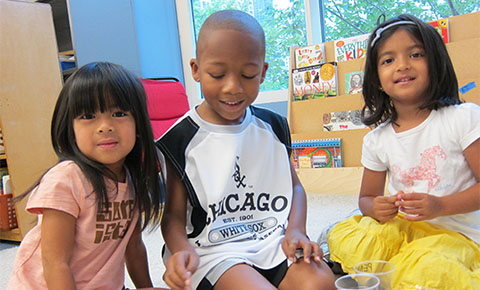What Happens When More Four-Year-Olds Attend Preschool?
August 23, 2022

State- and city prekindergarten (pre-K) programs that off free access to early learning for four-year-olds are on the rise both locally and nationally. Support for the project from funders like the Crown Family Foundation, Steans Family Foundation, CME Group Foundation, the Peterson Foundation, Chicago Public Schools, and an anonymous funder shows a growing interest in the potential impact of such programs on children, especially on achievement gaps.
Universal prekindergarten programs, however, typically have a hard time reaching children from the most economically disadvantaged backgrounds. The Chicago model addresses this by streamlining the enrollment process and offering enough slots to serve 95% of eligible four-year-olds in the city.
Led by economist Diane Whitmore Schanzenbach, director of the Institute for Policy Research, and Terri Sabol, a developmental psychologist who studies child development and social policy, the team will look at several important aspects of the program, including its impact on the wider childcare market and whether the programs can reduce educational inequities in Chicago.
“We have seen a substantial rise in interest in understanding the effects of pre-K programs on children, especially those in low-income families, and what this could mean for more robust policy interventions,” Schanzenbach said. “Previous research has shown that the effects of such programs can extend beyond addressing achievement gaps to a wide variety of outcomes, including physical health and adult earnings.”
In 2019, Chicago began rolling out universal prekindergarten to four-year-olds. Although many cities across the country already have universal programs, Chicago’s is notable in that it includes greater partnerships with community-based organizations and technical assistance and monitoring for prekindergarten teachers.
Yet it also was started during the COVID-19 pandemic, raising important questions on the combined effect of the rise of public preschool during a health crisis.
“The fragile childcare market was made even more unstable by the impact of COVID,” said Sabol, associate professor of human development and social policy at the School of Education and Social Policy. “We’re interested in understanding how rolling out free full-day school-based prekindergarten during this period affects the overall childcare landscape. It’s an important model for the country as it struggles to rebound from the pandemic.”
Using existing administrative and census data from about 20,000 children, the researchers will compare changes over time between communities that sent their four-year-olds to prekindergarten with those that didn’t.
They will also interview community based childcare providers and school-based universal prekindergarten programs, preschool and kindergarten teachers, and parents about opportunities and challenges that arose between COVID-19 and the universal prekindergarten policy change.
Previous research co-authored by Schanzenbach, the Margaret Walker Alexander Professor of Human Development and Social Policy, for example, suggests that universal prekindergarten will likely increase the number of publicly funded preschool slots for four-year-old children.
But removing these youngsters from the overall childcare market (birth through age 5) could further compound challenges in rebuilding the sector, which is struggling due to COVID-19 and increases in the minimum wage.
Researchers also will examine the varying quality of prekindergarten programs and grapple with the hairy question of how to best sustain or build upon any gains made through universal prekindergarten.
“The challenge is that children typically enter classrooms with a range of skills, which is often tied to their early childhood experiences,” Sabol said. “Teachers often responded by remediating the students who did not attend pre-K and are less effective at engaging and developing the students who were prepared with pre-K experiences.”
Chicago’s model is designed to serve all students in an area, which could change the classroom experiences for teachers and students going forward. But it’s still not clear whether kindergarten teachers would indeed change their practices as a result of universal prekindergarten.
Past evidence has found that CPS students’ test scores in elementary and middle school grow at a faster rate than almost any other school system in the nation. Yet, on average, CPS students start out behind in the early grades.
“With its unique community-research partnership, the Chicago Universal Prekindergarten initiative has the potential to transform how we think about and implement early childhood education in Chicago and beyond,” Schanzenbach said.